- California Assembly OKs highest minimum wage in nation
- S. Korea unveils first graphic cigarette warnings
- US joins with South Korea, Japan in bid to deter North Korea
- LPGA golfer Chun In-gee finally back in action
- S. Korea won’t be top seed in final World Cup qualification round
- US men’s soccer misses 2nd straight Olympics
- US back on track in qualifying with 4-0 win over Guatemala
- High-intensity workout injuries spawn cottage industry
- CDC expands range of Zika mosquitoes into parts of Northeast
- Who knew? ‘The Walking Dead’ is helping families connect
President Park calls for quick resolution of sex slavery issue
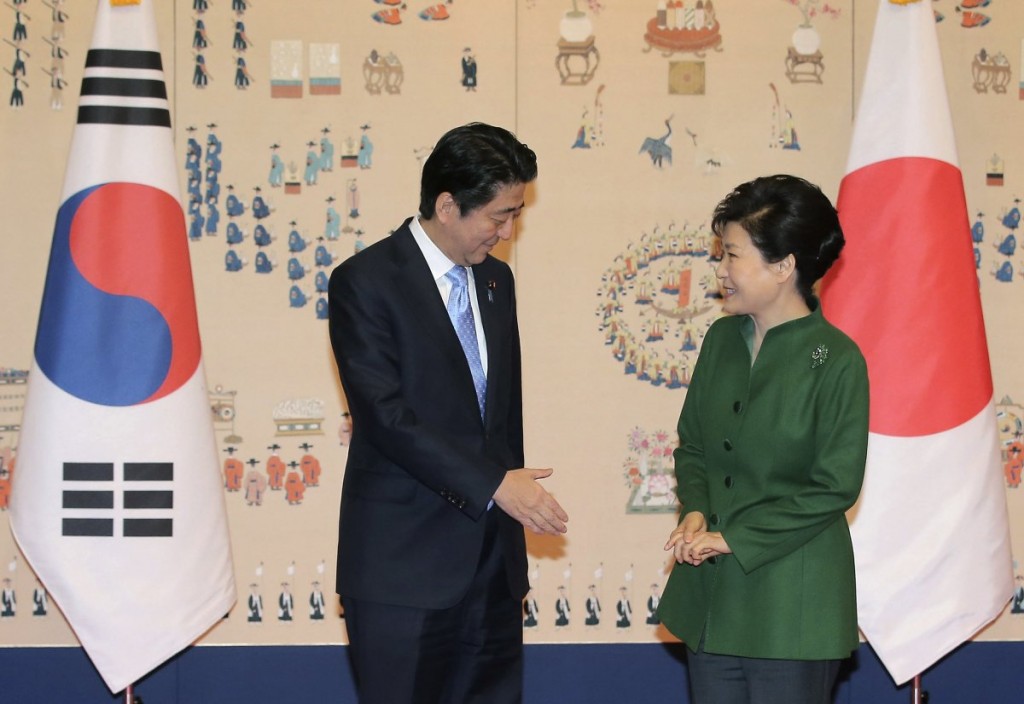
Japanese Prime Minister Shinzo Abe, left, offers his hand to shake hands with South Korean President Park Geun-hye before their meeting at the presidential Blue House in Seoul, South Korea, Monday, Nov. 2, 2015. (Lee Jung-hun/Yonhap
SEOUL (Yonhap) — President Park Geun-hye instructed officials Tuesday to quickly resolve the issue of former South Korean sex slaves for Japan’s World War II soldiers.
Park made the comment at a regular Cabinet meeting. Over a week ago, she met with Japanese Prime Minister Shinzo Abe in Seoul, and they agreed to accelerate negotiations to resolve the issue.
South Korea and Japan have failed to produce any significant progress in their working-level talks on the issue. It remains unclear if the latest agreement will have any influence on upcoming negotiations on the issue.
The sides have long been at odds over territory and other historical disputes stemming from Japan’s 1910-45 colonial rule of the Korean Peninsula.
South Korea demands Japan acknowledge its responsibility for the sex slaves, while Japan insists the issue was settled under the normalization treaty of 1965.
Park also reiterated that the issue of history textbooks for secondary students is not something that should be at the center of a partisan strife.
She said top experts from various fields will join the panel for state history textbooks, noting that most of the authors of history textbooks are tilted toward a specific ideology, in an apparent reference to left-wing ideology.
The government recently announced it will revise the current textbook publication system so that middle and high school students will learn Korean history through national textbooks starting in the 2017 school year.
Currently, history textbooks for secondary schools are published by eight private publishing companies pending government approval.
Park said the current history textbooks described South Korea’s history negatively and minimized North Korea’s provocations against South Korea. They also make it seem as if South Korea is to blame for the division of the Korean Peninsula.
The Korean Peninsula was divided into the capitalistic South and the communist North after its liberation from Japan’s 1910-45 colonial rule. Tank-led North Korean troops invaded South Korea on June 25, 1950, starting the Korean War. The war ended in 1953 in a truce, not a peace treaty.
Park also pressed lawmakers again to pass a set of free trade deals South Korea has clinched with its trading partners, including China, to boost Asia’s fourth-largest economy.
South Korea and China signed a free trade agreement in June, though the deal has yet to be ratified by the respective legislatures of Seoul and Beijing.
Park and Chinese Premier Li Keqiang have recently met and agreed to cooperate to ensure the bilateral free trade deal will take effect within this year.
South Korea has clinched a series of free trade agreements with major trading partners, including the United States, in recent years to boost growth in a country where exports account for about half of its gross domestic product.
Also Tuesday, Park asked the public to choose people with integrity to make sure that the parliament can work for people’s livelihoods, in an apparent appeal to the public ahead of next year’s parliamentary elections.
“People will never tolerate” if a set of bills meant to improve people’s livelihoods is automatically scrapped, Park said.
The bills, which have been gathering dust for months, are set to be scrapped by default in late May next year when the current term of the parliament ends.







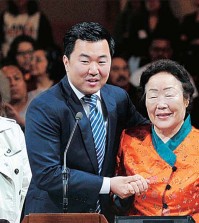
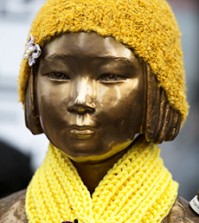
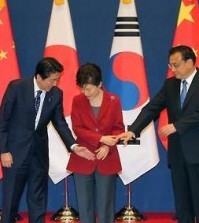
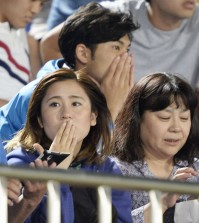

![일본 사도광산 [서경덕 교수 제공. 재판매 및 DB 금지]](http://www.koreatimesus.com/wp-content/uploads/2024/07/PYH2024072610800050400_P4-copy-120x134.jpg)


